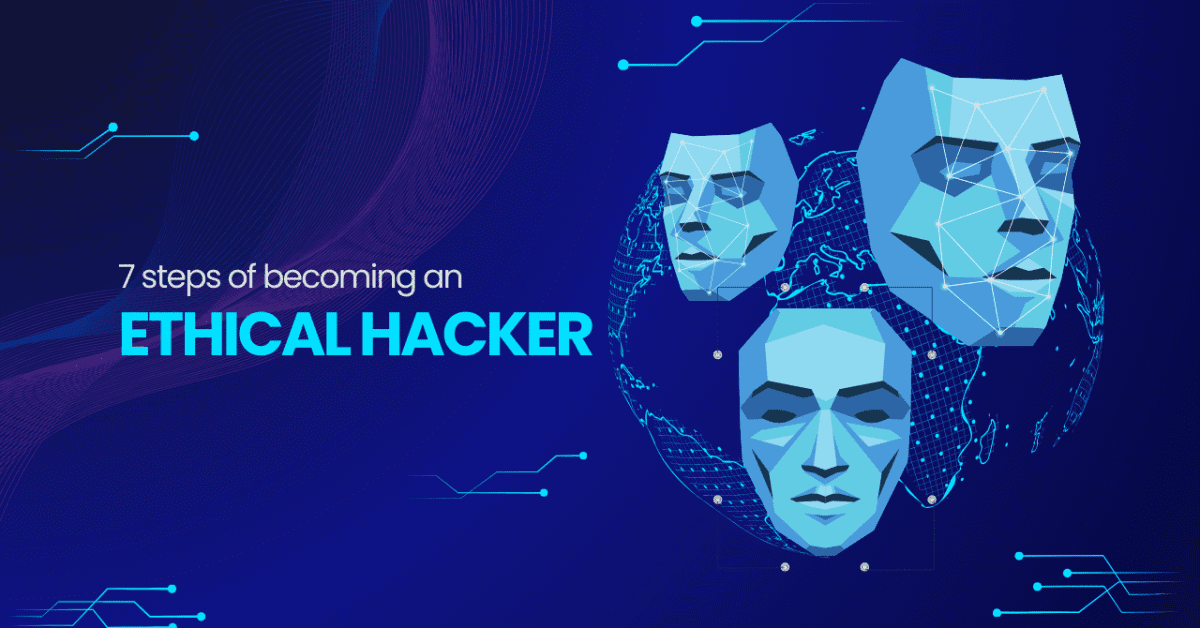In an era where cyber threats are becoming increasingly sophisticated, the role of ethical hackers, or white hat hackers, has never been more crucial. Ethical hackers are skilled professionals who use their knowledge of computer systems and networks to identify vulnerabilities and strengthen cybersecurity defenses. If you’re interested in pursuing a career in ethical hacking, here’s a comprehensive guide to help you get started.
Table of Contents
7 Steps to Become an Ethical Hacker

Becoming an ethical hacker involves a deliberate and structured approach to acquiring the necessary skills and mindset for responsibly identifying and addressing security vulnerabilities. Here’s a concise breakdown of the seven steps typically followed:
Step 1: Understand the Fundamentals
Before diving into the intricacies of ethical hacking, it’s essential to build a solid foundation of knowledge in computer systems and networking. Start by familiarizing yourself with the basic concepts of how computers operate and communicate with each other over networks. Explore topics such as hardware components, operating systems, protocols, and network architecture. Understanding these fundamentals will provide you with a crucial framework upon which to build your expertise in ethical hacking.
Step 2: Learn Programming Languages
Programming skills are indispensable for ethical hackers. Begin by mastering programming languages such as Python, which is widely used in cybersecurity for its versatility and ease of use. Learn how to write scripts to automate tasks, manipulate data, and analyze vulnerabilities. Additionally, familiarize yourself with scripting languages like Bash and PowerShell, as they are commonly used in penetration testing and security analysis.
Step 3: Gain Proficiency in Operating Systems
A solid understanding of different operating systems is essential for ethical hackers. Start by exploring popular operating systems such as Windows, Linux, and macOS. Learn how to navigate their file systems, manage users and permissions, and configure security settings. Additionally, practice setting up virtualized environments to experiment with different operating systems and security configurations in a safe and controlled manner.
Step 4: Familiarize Yourself with Security Concepts
To succeed as an ethical hacker, you must have a strong grasp of security concepts and principles. Study topics such as encryption, authentication, access control, and intrusion detection. Understand common vulnerabilities and attack vectors, such as buffer overflows, SQL injection, and cross-site scripting. Familiarize yourself with security best practices and techniques for securing systems and networks against cyber threats.
Step 5: Explore Security Tools and Techniques
Ethical hackers rely on a variety of tools and techniques to identify and exploit security vulnerabilities. Familiarize yourself with popular security tools such as Nmap, Metasploit, Wireshark, and Burp Suite. Learn how to use these tools to scan networks, discover open ports, analyze network traffic, and exploit vulnerabilities. Additionally, explore techniques such as reconnaissance, enumeration, and exploitation to uncover weaknesses in systems and applications.
Step 6: Obtain Certifications and Training
Certifications can validate your skills and knowledge in ethical hacking, making them valuable credentials for aspiring professionals. Consider pursuing certifications such as Certified Ethical Hacker (CEH), CompTIA Security+, or Offensive Security Certified Professional (OSCP). These certifications often require passing exams and may have specific experience or training prerequisites. Additionally, seek out training programs and courses that provide hands-on experience and practical skills in ethical hacking.
Step 7: Practice Ethical Hacking Responsibly
Ethical hacking comes with great responsibility. Always obtain proper authorization before conducting security assessments or penetration tests. Respect user privacy and confidentiality, and never engage in illegal or malicious activities. Uphold ethical standards and use your skills to protect and improve cybersecurity. Continuously seek opportunities to practice and refine your skills through Capture The Flag (CTF) competitions, bug bounty programs, and real-world security projects.
By following these seven steps and committing to continuous learning and development, you can embark on a fulfilling and impactful career as an ethical hacker. Remember that ethical hacking is not just about technical expertise—it’s also about integrity, responsibility, and using your skills for the greater good of cybersecurity.
Importance of ethical hacking in cybersecurity
In the ever-evolving landscape of cybersecurity, ethical hacking stands as a formidable ally in the ongoing battle against cyber threats and vulnerabilities. Ethical hacking, also known as penetration testing or white-hat hacking, plays a pivotal role in fortifying defenses, identifying weaknesses, and safeguarding digital assets from malicious actors. Its importance in cybersecurity cannot be overstated for several compelling reasons:
- Proactive Defense: Ethical hacking enables organizations to adopt a proactive approach to cybersecurity by identifying and addressing vulnerabilities before they can be exploited by malicious entities. By simulating real-world attack scenarios in a controlled environment, ethical hackers help organizations stay one step ahead of potential threats.
- Vulnerability Assessment: Ethical hacking serves as a crucial tool for conducting comprehensive vulnerability assessments across various digital assets, including networks, applications, and systems. By systematically probing for weaknesses and security gaps, ethical hackers provide valuable insights that empower organizations to strengthen their defenses and mitigate potential risks.
- Risk Mitigation: In today’s interconnected digital ecosystem, the risk of cyber-attacks and data breaches looms large. Ethical hacking plays a vital role in mitigating these risks by identifying vulnerabilities and implementing effective countermeasures to prevent unauthorized access, data theft, and other security incidents.
- Compliance and Regulation: With the proliferation of data protection regulations and compliance standards, organizations are under increasing pressure to ensure the security and privacy of sensitive information. Ethical hacking helps organizations meet regulatory requirements by conducting thorough security assessments and demonstrating due diligence in protecting data assets.
- Enhanced Incident Response: In the event of a security incident or breach, ethical hacking provides valuable insights and forensic evidence that facilitate effective incident response and remediation efforts. By understanding the tactics and techniques used by attackers, organizations can swiftly contain the impact of security incidents and minimize disruption to operations.
- Building Trust and Reputation: A robust cybersecurity posture is essential for building trust and maintaining the reputation of organizations, especially in sectors that handle sensitive data or provide critical services. Ethical hacking demonstrates a commitment to security excellence and instills confidence among customers, partners, and stakeholders.
- Continuous Improvement: Cyber threats are constantly evolving, requiring organizations to adapt and evolve their security measures accordingly. Ethical hacking promotes a culture of continuous improvement by identifying emerging threats, evaluating existing security controls, and implementing proactive measures to address evolving risks.
In summary, ethical hacking serves as a cornerstone of cybersecurity, empowering organizations to stay ahead of cyber threats, protect sensitive information, and maintain the trust and confidence of stakeholders. By leveraging the skills and expertise of ethical hackers, organizations can navigate the complex cybersecurity landscape with resilience, agility, and confidence.
Conclusion
On the journey to become an ethical hacker requires dedication, continuous learning, and a commitment to ethical conduct. Let’s recap the seven steps outlined in this guide:
- Understand the Fundamentals: Start by grasping the basic concepts of computer systems and networks.
- Learn Programming Languages: Develop proficiency in programming languages, particularly those commonly used in cybersecurity.
- Gain Proficiency in Operating Systems: Familiarize yourself with different operating systems and gain hands-on experience.
- Familiarize Yourself with Security Concepts: Learn about security principles, vulnerabilities, and common threats.
- Explore Security Tools and Techniques: Dive into the world of ethical hacking tools and techniques to enhance your skills.
- Obtain Certifications and Training: Validate your knowledge and expertise through relevant certifications and training programs.
- Practice Ethical Hacking Responsibly: Always prioritize ethical conduct and responsible hacking practices.
To all aspiring ethical hackers out there, remember that your journey will be filled with challenges and opportunities for growth. Stay curious, keep learning, and never underestimate the power of ethical hacking to make a positive impact on cybersecurity. With dedication and perseverance, you can become a skilled ethical hacker who contributes to a safer and more secure digital world.
Read More Related to Cyber Security from here



